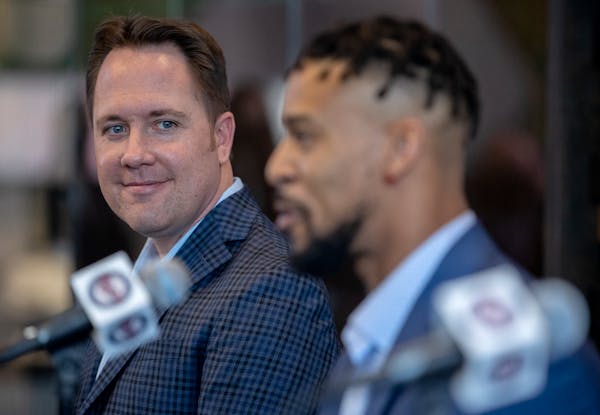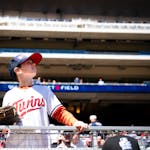The Twins were tied for first place in the American League Central on Sept. 4, and 14 games behind Cleveland when the season ended four weeks later. As you would expect after witnessing such a meltdown, the team's front office is basing its winter-alterations strategy on that September experience.
The tied-for-first part, they mean. The crash-and-burn-with-fill-ins finish, eh, that wasn't the team they had planned to field anyway.
"I recognize we still want to find a way to get better. But by and large, looking at the roster as is, if you just said, 'Poof, everyone is healthy at the beginning of next year,' I feel like the base is good," Derek Falvey, president of baseball operations, said during a 90-minute season-ending media session Monday. "Now, how do we find ways to add to it? How do we build a little bit more depth in our pitching staff?"
The Twins will still make significant changes, he said — Carlos Correa's likely departure into free agency is the most disruptive potential move, and the 53 players on the roster at season's end must be pared to no more than 40 within the next couple of weeks — but the underlying collection of talent, after a season of handing opportunities to young prospects, is more competitive than a 78-84 record and third-place finish suggests, Falvey said.
"Superficially, sometimes people want personnel changes just because if you make a change, therefore you're trying," Falvey said. "We had to assess whether or not change was needed. But this whole group, we feel like, is the right group to help lead us in the direction we need to go."
That goes for the coaching staff, too. One thing Falvey said he won't do: Blame manager Rocco Baldelli or his staff for a season the Twins clearly feel was on track until their season-long storm of injuries turned into a tsunami in the final month, forcing the Twins to play their eight decisive September games against Cleveland without six Opening Day regulars or most of their pitching rotation.
The Twins have fired head athletic trainer Michael Salazar, Falvey said, though he emphasized that "it would be totally unfair to him and totally unfair to the work he put in" to blame him for the devastating onslaught of injuries that derailed the Twins' season. But the team intends to re-examine its medical policies, too, "to think through what we can be doing to better handle soft-tissue issues, things that are preventable, so to speak, and things we can get stronger today," he said. "There's some luck that plays in [to injuries], but we can't just chalk everything up to luck and hope for the best."
Falvey said he believes the entire major league coaching staff will return next year, unless another team hires someone away, and he is considering bringing in an additional coach to help with pitching coach Pete Maki's workload.
He asked for input from the team's pitchers about Maki, assistant pitching coach Luis Ramirez and bullpen coach Colby Suggs, all of whom had to learn new responsibilities when former pitching coach Wes Johnson left for LSU on July 1. "It's a really hard thing to do. … Actually executing [pitching plans] with pitchers who were used to one voice during the season, that's a challenge," Falvey said. "We're continuing to evaluate it, but we feel really good about the growth of those guys going forward."
Particularly when he looks at the pitching staff they'll coach, which this year included 36 different pitchers (plus two position players). With Kenta Maeda on track for a return next spring, with Tyler Mahle having a winter to prepare, with Sonny Gray and Joe Ryan heading the rotation and Bailey Ober having returned with four effective September starts, Falvey said he is more confident than ever that the Twins are headed toward far greater success on the mound.
"Not to say we won't have conversations in the pitching market, for sure, but we feel like we have maybe more depth in starting pitching than we've had in this juncture over the last few seasons," Falvey said, pointing to the impression that rookies Louie Varland and Simeon Woods Richardson made in late-season starts. "I've been in this meeting before, where you're asked, 'Well, you have one starter going into next year, how are you going to fill out the rest of them?' I feel better than I have in most years."
He would like to find a workhorse who can remain effective for more than five innings per start, a rarity on the 2022 staff, especially for likely-to-depart veterans Chris Archer and Dylan Bundy. He wants to replace free agent Gary Sanchez with another experienced catcher, find more speed for the roster in anticipation of a more robust running game unleashed by next year's rule changes, and work on cleaning up base-running mistakes in general.
He'd like to bring Correa back, and find a way to keep Byron Buxton healthy for more than 92 games, too.
"Those are two marquee guys. … If we can find impact talent, we're going to go find it," Falvey vowed. "But I feel like our group, from a depth standpoint, is good."






